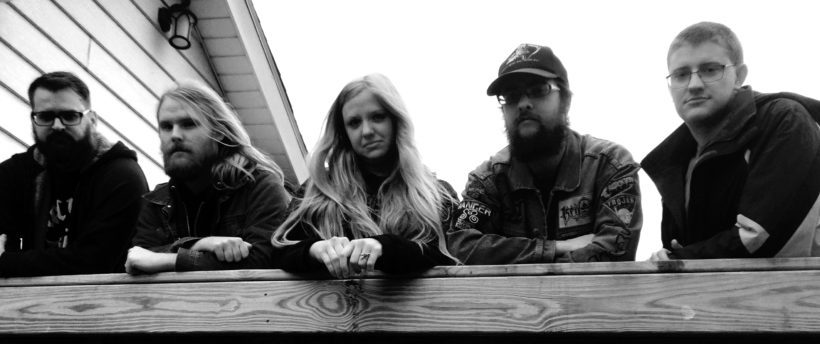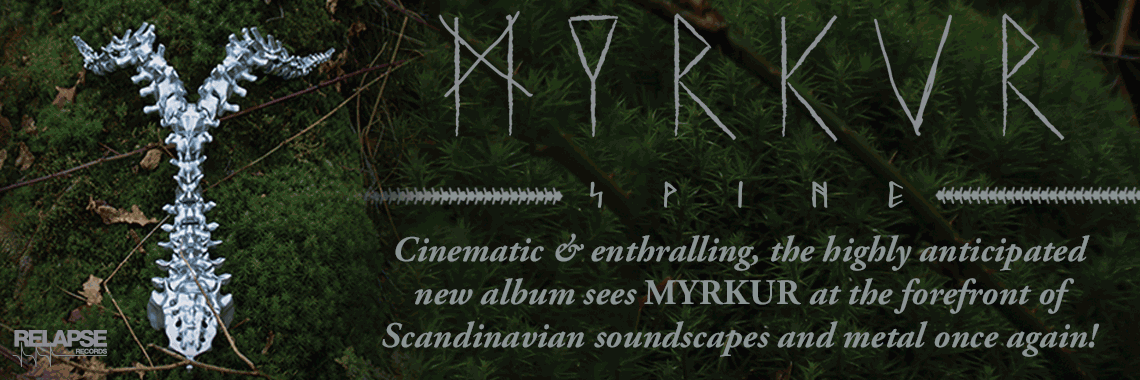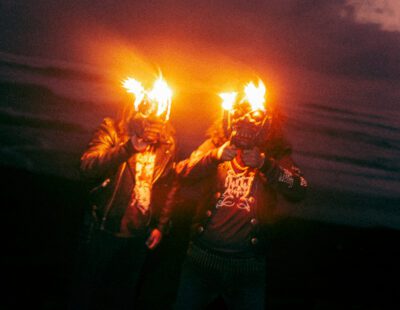
One listen to “Voyage of the Sun Chaser” should exhibit why The Sword Woman, the first demo cassette by Toronto-based epic doom band Smoulder is sold out weeks before its release (only on Bandcamp don’t worry – We’ve got the direct link). Tuneful and narrative, it is more than just a competent workout of a well-established metal trend—it’s just a damn good song. Of course, it helps that this particular style, one that a few years ago seemed condemned to the very deepest pit of obscurity that metal could offer, is making something of a comeback. Smoulder’s well aware of this fact. Their vocalist, Sarah Ann, spoke about this topic as well as the history of the outfit, with us.
To begin, can you tell me the story of how Smoulder formed?
Sarah: Smoulder began in Calgary, Alberta back in 2013. Vincent and I started jamming at a house party then decided we want to form a band; he was on guitars and vocals, I was on drums and wrote lyrics. After a few years of jamming and creating the frameworks of our songs, we realized we wanted to get the band going seriously but also realized that no such “scene” existed for epic doom where we lived. We eventually decided to relocate to Eastern Canada, and concretely confirmed we would be trading off musical duties because, try as I might, I couldn’t sing in this epic style and be visually engaging on stage while playing drums — I’m not Proscriptor McGovern, it’s a goddamn tragedy.
Shortly after relocating, we began aggressively pursuing a full line-up. Eventually, we recruited friends from the United States who we had traveled to Frost & Fire and Legions of Metal with, they are also in an epic doom band called Olorin. Kevin and Collin agreed to record the tracks we had ready for the demo “The Sword Woman.” That demo will likely be the only release written by Vincent and myself. We are now a fully functioning band who is working on our full-length and preparing to play shows. We trade ideas and song frames online; both Vincent and myself will write songs and jam frequently together; same goes for Kevin and Collin. All of us edit and re-arrange and contribute. It’s quite simple, despite having such distance between us. We all really enjoy being in a band together and now have added a bassist named Adam to the mix as well who is also starting to contribute.
The word Smoulder shows up in the first song, “The Sword Woman”. What came first, that lyric or the band name?
Sarah: The band name came first. When Vincent and I started jamming, we were both fairly aggressive about getting a strong, one word band name that automatically implied doom metal – quick, punchy, to the point. I liked the notion of something being reduced to a smoking rubble, particularly in the context of epic doom. It’s a genre that celebrates and romanticizes narratives about conquering. Smoulder was born, and it was just our luck that no one else had already used it.
I dislike going track by track most of the time, but since we’re just talking about a three-song EP, what can you tell me about the song we are premiering, “Voyage of the Sun Chaser”?
Vincent: I wrote this track long before Smoulder was even an idea. While the song is faster and more upbeat then “The Sword Woman” It was originally an even faster power/speed metal ripper that never ended up being used in any of my previous projects, so I reworked and slowed it down to fit what we’re doing in Smoulder. The song chronicles a story from the Dragonlance Universe about a ship sailing to the city of Istar during-slash-immediately following an event called the Cataclysm, in which the gods drop a mountain of fire on the city due to the arrogance of the Kingpriest who has demanded to become a god.
The last song on your EP is a cover of “The King is Gone” by Nightmare. I’ll admit I’ve never heard of Nightmare before, which doesn’t happen to me that often anymore! You’ve re-made the song as “The Queen is Gone.” So, why chose this song by this band to cover?
Sarah: We enjoy Nightmare; they are a Columbian band that makes fantastic speed/heavy metal. We liked the idea of covering a band that only had one doom song, particularly because traditional and epic doom are rather poorly understood, particularly with the huge popularity of stoner and sludge genres. Traditional and epic doom often overlap and intersect with speed, trad, thrash, and power metal, yet that part of the genre is somewhat unsung because it gets lumped into other musical histories and so many of the bands that play that style are incredibly obscure. So it was a bit fun and ridiculous to choose a song by a speed metal band that had only one doom song. But, honestly… it’s because the song is really goddamn good and it’s fun to play and sing.
Also, though it seems pretty obvious to me, it’s probably worthwhile to ask why you re-cast the song as being about a female protagonist?
Sarah: One of the greatest joys of heavy metal, sword and sorcery, or hell, really any art you dig into is seeing part of yourself in that epic hero. Given that Dark Agnes de Chastillon, who is Robert E. Howard’s protagonist in The Sword Woman, has informed a lot of my artistic output in writing, painting, and radio over the past several years, it seemed a natural fit to lovingly reimagine the character in the “King is Gone” as a Barbarian Queen.
You’re also a metal journalist of some renown – your review series on Banger TV is pretty popular, not to mention sometimes contentious — the consternation of your comment section has given me no small amount of amusement. How do those two aspects of your creative exercise, the critic, and the musician, interact? And how are they distinct?
Sarah: Being a metal journalist and critic for the past 13+ years has meant that I’ve spent a good chunk of my life listening to a huge variety of music. Of course, a large part of being obsessive meant trying my best to understand and contextualize where every band fits in the history of heavy metal. Simultaneously, it forced me to try to understand what’s both good and bad about music, regardless of whether it conforms to my individual taste or whims. Although it’s meant that I’ve spent huge amounts of time hyper-focused on bands I wouldn’t necessarily otherwise spend any time with, this career path has taught me a lot about the history of the genre and appreciate a vast amount of music in many genres beyond metal.
Honestly, there are few things I enjoy more than having a good long think about how band “A” fits into a long, winding lineage of music and then create stupidly complex playlists that confirm and deny my suspicions. I put a lot of work into my journalism, and I think that passion is well communicated. But, it also gets people really worked up. It’s because a lot of music fans care as much as, if not more than, I do about this music.
As for making music, the vast majority of underground heavy metal musicians play what they want to hear. Given that our band has substantially evolved over the past five years from its primitive origins to where we are now, I can say that I approach music making much as I do music journalism – I try to not only borrow from the rich history of the genre but also be incredibly critical. Our band started out very slow and had more of a cavernous thumping style and low vocals; now it’s a faster merging of power and doom with soaring vocals. It’s been great being able to hear our progress, and not only that but be actually excited about where we are now and be slow about making things exactly right before releasing anything. For future recordings, there will be five of us contributing. We all get to edit and also be mindful of one another’s preferences. It’s a collaborative environment, and it helps that we can all voice our opinions about what does and doesn’t work. We’ve already written the majority of a full-length and it’s very exciting.
Last but not least, Smoulder plays a kind of music that you and I have both written about a few times—a revival of sort of pre-extreme metal with fantastic storytelling elements. This style seems to be rebounding in popularity at present, against all odds, if it was ever that popular to begin with. Why did you decide to play this style of music and why do you think it’s experiencing a revival or rediscovery right now?
Sarah: Oh boy, this is a can of worms. Honestly, the shortest answer is metal is extremely cyclical and now any person can go online and listen to virtually any band they want in the history of metal so it’s easy to learn a lot about the genre in a short period.
Now, the long answer: When I first started listening to metal in junior high, the big things were mathy style hardcore (think Dillinger Escape Plan, Converge, The End) and Quebec style tech death (Cryptopsy, Neuraxis, Gorguts). Because metal fans and musicians tend to be pretty reactive about styles dominating their ears, I think a backlash grew against this extreme technicality and a resurgence of classic genres began in the early to mid-2000s. The styles have been cycling through in waves. Thrash, doom, speed metal, now it’s traditional metal. Of course, this has been added by the widespread usage of the Internet. When I was in junior high it wasn’t yet a widespread tool, so rather than look bands up online, I was searching for them in HMV and A&B Sound and taking advice from the folks who worked there and blowing $22 on an import CD because the cover looked cool and there was potential for it to maybe be good. Now, in contrast, anyone who is interested in a band can look them up on Encyclopedia Metallum, listen to their top rated albums, then search interviews about which bands that band was inspired by, and then go and listen to that too. We have untold riches at our fingertips and it’s making people look further into the history of the genre. Plus, it’s no secret that us metal fans are huge fucking nerds who love introducing their friends to bands, so there’s a competitive edge to it.
As for playing this style of music: it was never really a conscious decision to be part of a tide, it just happened to coincide because we’re surrounded by inspiration and have cultivated a huge group of amazing friends who like, play, and perform this stuff. Being surrounded by talented people and immersing your entire life in your interests is incredibly conducive to making art. We are very fortunate.
The Sword Woman is, of course, out on 4/20 of this year. Follow Smoulder on Bandcamp.
Here is that cassette pre-order.
Smoulder will be making their live debut on that same day in Chicago, with support from Lady Beast, Professor Emeritus, and Black Road. Details here.







